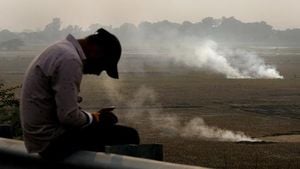In the intricate web of human history, the journey of our ancestors from hunter-gatherers to settled farmers remains one of the most fascinating chapters. Recent studies delve deep into these transitions, illuminating how human adaptation and survival strategies have shaped modern genetics. One striking revelation from these studies is the rapid evolution that took place as European hunter-gatherers clashed and merged with incoming farming communities from the Middle East.
Imagine meeting a European hunter-gatherer from 7,000 to 8,000 years ago. With dark skin and likely bright blue eyes, these individuals would stand out dramatically against the more familiar appearance of light-skinned, brown-eyed European farmers who began populating the region. This shift in appearance is closely tied to diet and lifestyle changes, particularly the adoption of milk and grain-based diets over meat-rich diets. The gene for lactose tolerance, for instance, became prevalent among these farmers, allowing them to digest milk without issues.
The transition from hunter-gatherer societies to farming communities in ancient Europe exemplifies a phenomenon known as fast human evolution. Unlike the gradual, millennia-long evolution typically discussed in textbooks, this period saw rapid genetic changes driven by cultural and environmental shifts. Although evolution is often seen as a slow dance, this particular chapter in human history resembles a fast-paced race for survival.
This swift evolution is not entirely without precedent. Researchers like Peter and Rosemary Grant have demonstrated in their studies of Galapagos finches how climate and available resources can induce significant changes within a single generation. These fast changes, however, are not always permanent. Similarly, in ancient Europe, the genes favoring light skin and brown eyes became dominant as they likely provided adaptive advantages in the new farming-centric lifestyle. Genetic variation in the population facilitated this rapid change, highlighting Darwin's principle of natural selection at work.
David Lahti from Queens College and Paul Ewald from the University of Louisville both assert that rapid evolution reflects intense selective pressures. These pressures might include predation, disease, and changing climates. For human populations, social selection — the interactions and conflicts between groups — also played a crucial role. Whether through hostilities or peaceful exchanges, the merger of hunter-gatherers and farming communities led to new genetic realities in Europe.
Interestingly, the phenomenon of fast human evolution is not just a relic of the past. As we face new challenges like climate change and emerging diseases, our genes continue to adapt. Just as light-skinned individuals adapted to vitamin D deficiencies in northern Europe, future adaptations might respond to modern-day pressures we are only beginning to understand. The ongoing nature of this evolution underscores the dynamic relationship between human beings and their environment.
The rapid evolution observed in ancient Europe offers a glimpse into the broader processes that drive genetic change. This fascinating interplay between cultural practices, environmental changes, and genetic adaptation continues to shape our species. As we reflect on this legacy, one can only wonder what future changes might be in store for humanity.



